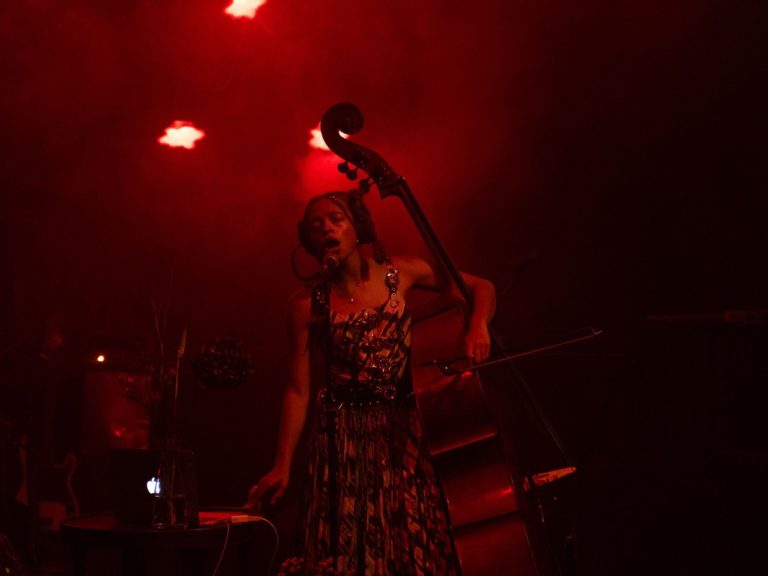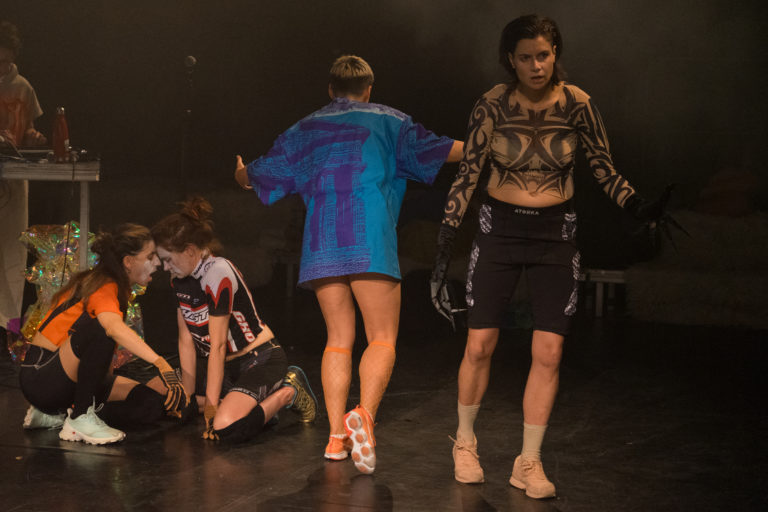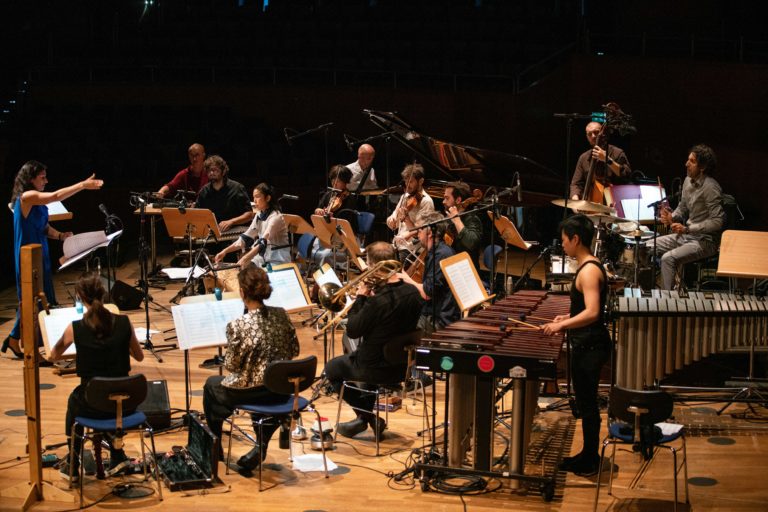Author: Manon Moulin
Germany's independent cultural sector faces a major crisis as the government announces sweeping budget cuts targeting six key cultural funds. With the total budget for the arts unchanged, these cuts disproportionately impact non-commercial, experimental projects that thrive on diversity and innovation. Cultural workers have mobilised through petitions and public campaigns to raise awareness and push back against the drastic reductions, warning that such measures threaten the survival of independent art in Germany.To get the pulse of the independent cultural sector, we interviewed Laurens von Oswald and Harry Glass, co-founders and artistic directors of the Berlin Atonal festival, as well as Jonas Petry and Amelie Neumann, co-artistic directors of Leipzig-based festival Seanaps, Cymin Samawatie, musician, pianist, singer, conductor, composer, and co-founder of Trickster Orchestra, Heinrich Horwitz, freelance choreographer, actor, and performer, and finally Gregor Hotz, managing director of Musikfonds.

Multi-instrumentalist Damsel Elysium at Seanaps 2023 – © Ines Könitz & Corinna Mehl
On July 16th, 2024, the German cultural sector has received a shocking and sudden notification. Claudia Roth, the Federal Government Commissioner for Culture and the Media–the equivalent of a Minister of Culture, although there is no such thing in Germany– presented a draft bill for the overall budget of the Federal Government Commissioner for Culture and the Media (BKM) for the year 2025, in which the funding of the six funding foundations was drastically cut. The six federal funds–the Literature Fund, the Translators' Fund, the Performing Arts Fund, the Sociocultural Fund, the Music Fund and the Art Fund Foundation–are the institutions that primarily fund independent culture and recognise the importance of experimental and innovative practices. These cuts pose a significant threat to independent cultural actors in Germany, but they also appear to be targeted at them, as the general budget of the BKM has not changed, giving priority to other kinds of cultural practices.
The Surprise Factor
“It was pretty surprising; they didn’t tell us in advance that the cuts will be so substantial, and we just got an email, very brutal,” explains Gregor Hotz, managing director of one of the six funds affected by these cuts, the Musikfonds. If the directors of the funds hadn't been consulted before the announcement, revealing a serious miscommunication within the administration, the surprise was also total for the cultural actors themselves. Indeed, both the announcement and its timing came as a surprise, as most people were on holiday at the time. “People freaked out and were so helpless, especially because it was during the summer break, which is also pretty mean from politicians to do this at this time of year,” points out Heinrich Horwitz, choreographer, actor, performer, and ActOut activist. In response to this astonishment, Heinrich Horwitz, together with other cultural workers, decided to launch a petition to raise awareness of the damage these cuts would cause and to unite the independent sector.
Independent Cultural Sector for a United Response
On July 31st, Heinrich Horwitz submitted the petition on their behalf, as their activist experience is notable and recognised in the German scene. The petition, entitled “Saving up on independent art costs too much!”, quickly gained thousands of signatures, and was massively shared on social medias–“it got viral,” says Heinrich Horwitz.
“The advocacy and political work being done by members of the independent scene itself is truly amazing, not least because independent artists and musicians are not paid for this kind of work, and some individuals are really putting in a lot of effort that will benefit the whole scene. We wondered how to connect the multiple scenes and their respective interests and found that a petition that calls out the dramatic precariousness created by the government’s plans was the right way to go forward,” says Cymin Samawatie, musician, singer, conductor, and composer, as well as co-founder of Trickster Orchestra, an ensemble bringing together artists from various backgrounds, genre, and musical traditions, breaking down the rigidity of music towards a trans-traditional music born of radical diversity and musical multiperspectivity.
6 weeks after it was launched, the petition had 36,607 signatures. This is a significant number, especially for the independent scene. “The independent scene is quite well connected and united, and this brings the independents from theatre, dance and music closer together,” explains Heinrich Horwitz. Independent artists have also received support from the funding institutions, in particular from Holger Bergmann, director of the Fonds Darstellende Künste, and Gregor Hotz. This success is also proof of the scene’s ability to unite its audience. By bringing together cultural practitioners and audiences, this petition has helped the independent cultural scene to communicate at eye level with the federal administration. In fact, the growing interest in the announcement of the cuts pushed the BKM to invite Heinrich Horwitz and other artists to defend the petition: “The fact that we were invited by the ministry also shows that the pressure is now very high.”

FLIPPER. Performance at Ballhaus Ost Berlin, funded by Fonds Darstellende Künste – © Maria Boltz
And it went even higher with the press conference organised by the same cultural workers behind the petition, including Heinrich Horwitz and Cymin Samawatie, on September 2nd at the independent theatre HAU (Hebbel am Ufer), in Berlin. The press conference was attended by 25 journalists, which both Heinrich and Cymin point out is a lot for the independent scene. This event has led to many interview requests and better press coverage in Germany–unfortunately not enough outside of Germany. The main takeaway from this press conference is that the independent scene is the one working and showing variety, diversity, and multiplicity of cultural perspectives, and it needs support. As Cymin Samawatie points out “the independent cultural scene in Germany is defined by its extremely unique talents, its ability to take risks, and its ideas, but what most defines it is its vast diversity, not only of artistic forms but of people–it is one of the most ethnically, socially, and culturally diverse spheres of our society and a hub for international perspectives,” and goes on to explain that this reality is not reflected in the administration, “because the closer you enter into the spheres of politics and power, the less diversity you’ll find.” This fight for a better representation in the sector could be one of the casualties of these budget cuts, as with less money to distribute, fewer projects will be funded, threatening already marginalised communities, be they BIPoC, queer, or disabled.
Threats and Instability for Independent Cultural Sector
The German independent cultural sector, like many of its European counterparts, is facing numerous challenges, with funding clearly at the top of the list. “Funding is indispensable because the type of work, the way of working that we fund and try to support, is music that cannot survive commercially, on the capitalist music market,” explains Gregor Hotz, using the example of the independent music scene. The federal money distributed by the six funds is in fact the key to the experimentation that is at the heart of the independent scene, as well as to the preservation of its creativity and freedom of expression. “The cuts are very significant and a bad omen, as the federal funding bodies for the independent arts scene play a crucial role in ensuring that non-commercial but important projects for cultural diversity in Germany have some sort of minimum financial security,” explains Jonas Petry from the Seanaps festival in Leipzig. The announced cuts only exacerbate a situation that is common to all independent cultural organisations: project-based funding. As Gregor Hotz points out, “Most artists and organisations are handing in one application after the other and they don't know if it's going to work or not.” This uncertainty will only be deepened by these cuts, as the Musikfonds’ budget would drop from 5,25 million in 2024 to 2,9 million in 2025, a reduction of almost 50%. “It’s going to have a big impact on the funding rate. At the moment, we reach something like 15% of applications funded, and with the cuts it will surely drop. At a certain point you start to ask yourself if you still want to spend time on an application if the chance of being funded is less than 10%?,” wonders Gregor Hotz. This reduction will affect the sector “which will be less diverse, it will also be harder for new projects to emerge, and hard for somewhat established projects to sustain their work. Without this kind of funding, there would be no Seanaps festival with this outreach and network,” point out Jonas Petry and Amelie Neumann. Heinrich Horwitz confirms and adds “Our situation is already precarious. We are living from hand to mouth, from project to project. Nothing pays us regularly. And now cutting the money in an inflation time, which impacts our lives but also the price of production for performances, means that people won’t be able to continue doing their job. And we already saw that after covid, a lot of people quitted arts and culture. It will make the scene less flourishing and diverse.”
There is also the issue of recognition when presenting and defending one’s cultural project or applying for funding. Cymin Samawatie highlights that in the 2010s it was difficult to get funding for an ensemble based on presenting music and social diversity–the Trickster Orchestra was finally re-funded in 2018, when Germany started to “talk about diversity.” When working with local scenes or experimental cultural practices, establishing a relationship with the administration can be a real challenge. Harry Glass and Laurens Von Oswald from Berlin Atonal explain; “We just want to convince decision makers that we are worthy of being taken seriously. It’s harder than ever to get government agencies in Germany to recognise that what you’re doing is important and deserves a sustainable, forward-looking approach to economic self-sufficiency” and add “what we want is to engage meaningfully and transparently with the State to achieve a healthier cultural scene.” This confirms the general lack of determination on the part of the BKM administration, which, with this announcement, has decided not to give priority to independent art and culture. This atmosphere is worsened by the rise of the extreme right in Germany, which won regional elections in two of the former GDR regions in early September. Regional and local funding for independent cultural players may be called into question in this context. Plus, with a general election due next year, one wonders whether the federal funds will continue to exist and support independent culture in a far-right government scenario.

Trickster Orchestra – © Susanne Diesner
From the budget to project-based funding, from inflation to heavy bureaucracy to the threat of the far right, the German independent sector is looking to the near future with a bitter and anxious feeling. After completing the petition and handing it over to Claudia Roth on September 11th, 2024, Heinrich Horwitz, Cymin Samawatie, Gregor Hotz, Jonas Petry, Amelie Neumann, Harry Glass, Laurens Von Oswald, and all cultural workers from or supporting the independent scene are waiting to see what the government's response will be. Will it stick to its positions and defend a terrible budget for 2025 in parliament? Will it backtrack and revise these cuts? Will Parliament vote for the cuts or will it amend the budget? Many questions remain unanswered at the moment, but Reset! will do its best to document and update, while sending its support to the German independent cultural scene in these unstable times. Nevertheless, Reset! member representing Seanaps, Jonas Petry gives an important reminder that “this independent cultural landscape has such a vibrant potential to give space to subversive, reflective, sensitive and utopian approaches. It's up to democracy to realise the real value of this treasure.”
References:
Gregor Dotzauer, Verpuffter Elan: Bundeskulturfonds wehren sich gegen Kürzungen (Fizzled out vigour: Federal cultural funds defend themselves against cuts) – Tagesspiegel
German Federal Budget Cuts Threaten to Halve Funding for Independent Art – Artists at Risk
Severe Cuts to the Federal Cultural Funds indicate a lack of consistent and sustainable support for the independent arts and culture scene – Fonds Darstellende Künste
AN DER FREIEN KUNST ZU SPAREN, KOSTET ZU VIEL! (Saving up on independent art costs too much!) – Petition launched by Heinrich Horwitz which reached 36,607 signatures in 6 weeks, and was handed over to Claudia Roth on September 11th, 2024.
Published on September 24th, 2024
About the author:
Manon Moulin is the editorial coordinator of all European projects for the non-profit organisation Arty Farty. She specifically works on the European network of independent cultural and media organisations Reset!, as well as the aggregation media We are Europe.